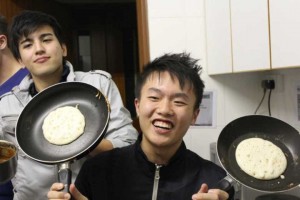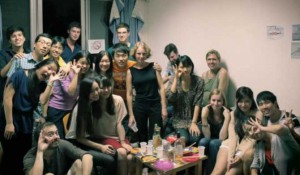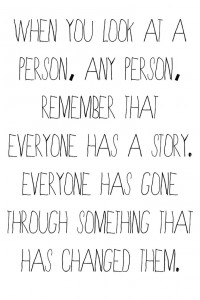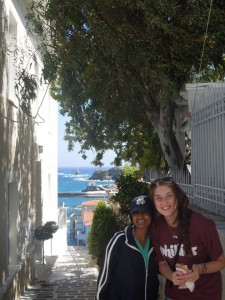University of Notre Dame undergraduate student Charles Cong Xu won first place in the Chinese University of Hong Kong’s (CUHK) 2012 Study Abroad Writing Contest. Xu, an undergraduate student majoring in Environmental Sciences with a minor in Chinese, is studying at CUHK for the 2012-2013 academic year. Xu’s winning essay is posted below.
A Permanent Sojourn: The Chinese Born American Perspective
Day 35 in Hong Kong: That preserved duck leg I had for dinner was way too salty. It was too bad they ran out of spicy chicken legs. *Yawn* Man, I should really stop Skyping home at 3 in the morning, but it does make me feel less homesick. Now, here I am in the 24 hour study lounge in central campus of the Chinese University of Hong Kong pondering upon the last 19 some years of my existence, trying to make sense of my “story”. I feel like there is too much to say, too much for it all to make sense, for it all to mean something. Practically my entire life has been an international experience and they expect me to condense it down to a mere 2000 words? Impossible I say, but I suppose I should start from the beginning.
I was born in the city of Wuhan, China and grew up within the grounds of Wuhan University. From the few pictures hanging on my wall at home to the scattered stories told by my parents, my memories of Wuhan and of China are left vague and surreal. I remember the hot humid nights when I couldn’t fall asleep and all I could do was listen to the chirps and buzzing of insects outside. I remember going out with my parents at night to find the watermelon vendor and slapping countless melons until we found our prize. I remember cutting the watermelon into halves and the three of us would dig in with spoons as if nothing else in the world mattered. I remember the joy of chewing on bite size chunks of fresh sugar cane that my mom had just peeled and cut. I remember my extreme sadness when I learned that my mom was going away for a while, to the United States of America to study.
Unbeknownst to me at the time, my mother had successfully applied for a Ford Foundation scholarship to pursue a Master’s degree in Women’s Studies at the University of Northern Iowa in Cedar Falls, Iowa. It mattered little to me. All I knew was that at the age of 5, my 妈妈 was half way around the world and I didn’t know when would be the next time I could see her. 6 months passed and all the legal documents had been filed, the visas applied for, and the flight tickets booked. My first international experience was not by choice, even though I wouldn’t have chosen to stay. My family meant more to me than my hometown; my family was my home. The three of us were again reunited, but this time in a strange and bizarre world that none of us had any experience with.
When I first came to the United States, I was distinctly Chinese. I did not know a single word of English and the first thought I had when I saw a McDonald’s was “They have McDonald’s in America too?” I was immediately enrolled in the English as a Second Language (ESL) class at my elementary school. Although I picked up the language rather quickly, I remember I still felt very different. I could not communicate with my classmates or my teacher. I had to point in order to tell the teacher I needed to go to the bathroom. In a town of only 30,000, being Chinese is something special – sometimes good, sometimes bad. There were those who were genuinely interested in learning how to say pencil in Chinese. There were also those who assumed all Chinese people knew Kungfu. Getting picked on and having pieces of paper thrown at you without being able to retaliate without getting physical tends to get you into trouble. I can’t say it wasn’t worth it though. Within a year and a half, I had “graduated” from ESL and moved to the Twin Cities in Minnesota. Language became less and less of an issue, but the cultural differences remained.
They say “When in Rome, do as the Romans do”, but I guess I never took that saying to heart. I remember thinking that Americans were quite primitive for eating vegetables uncooked, and it has taken me many years to get used to salads. One of my favorite snack foods in China was干脆面 or dry crispy noodle snacks for kids that are made to be eaten uncooked. Although they are extremely common in China, they are very rare in the U.S. So instead, I started eating uncooked American style ramen as a snack. I even brought it to elementary school with me to eat during break time. I remember it took a lot of convincing to get the first kid to try it. A few weeks later, literally half the class brought their own little ramen bags. The practice even popped up in other classrooms by kids who I didn’t even know. When I look back on this, I’m beginning to realize that I was not just eating uncooked ramen because I enjoyed the taste, but I was reminiscing about my life in China along with all the kinds of food I had grown up with. Yes, I started to like pizza and pancakes after moving to the U.S., but I also brought my home culture with me in the form of uncooked ramen, which was apparently embraced by the local Americans. Little did they know, not only where they enjoying a new snack, but by adopting the practice of eating uncooked ramen for snack, my classmates had helped me feel more accepted as an American. The metaphor of the American “melting pot” was never truer as 干脆面 was added to the pot.
Growing up in the U.S., I had a disproportionate amount of Asian friends. Although Asians probably accounted for less than 10% of the population, more than half of my friends were American born Asians or immigrants like me. This is still very much true today, even in my university life. Perhaps the reason is because we have all shared similar experiences of being excluded from the mainstream, of enjoying the same activities, and of having similar issues at home with often overbearing parents, at least compared to our American friends. Communication and mutual understanding is much easier, and you don’t have to explain why you eat rice all the time or why you can’t come out to play because you’re too busy studying or practicing the piano.
Fast forwarding some years leads my family and me to South Bend, Indiana. By this time, I had spent more time in the U.S. than in China, and my English had far surpassed my Chinese. Today, although I am able to speak Mandarin conversationally, my reading and writing skills have regressed past what I knew as a first grader in China. Somewhere along the way, I had transformed from being distinctly Chinese to at least moderately American. When my family and I eat watermelon these days, we do so half the time with spoons and half the time in slices. Perhaps all of these things mean that I have assimilated to American culture and have forgotten my roots. Perhaps this is true, but I actually know of many people who have moved to the U.S. like me who have completely forgotten their native tongue. In fact, their parents may not want them to learn Chinese because they feel it would be harder to become “American” that way. I completely disagree and am proud that I can still speak Mandarin. I think there is value to all cultures and being able to transverse between cultures is anything but a disadvantage.
13 and a half years passes faster than one would think and I had not had the opportunity to return to China. I felt like I missed out on all those family gatherings, all those missed birthdays, mid-autumn festivals, and especially Chinese New Years. Some days, I wonder how much closer I would be to my grandparents had we stayed in China. I learned today that one of my cousins is about to have an engagement party in the next month. I didn’t even know she had a boyfriend. I had forgotten what real 干脆面 and I couldn’t even tell you how many provinces are in China if you asked. In a sense, I had forgotten what it meant to be Chinese and was left clinging to my uncooked ramen. I desperately wanted to rediscover my roots, the parts of me that I had left behind.
Thus, when I learned that my home university, the University of Notre Dame, had an exchange program with the Chinese University of Hong Kong, I applied immediately as I knew this would be the perfect opportunity for me to return to China. I am the first year-long exchange student from my university, and so far it has been a rollercoaster of an experience. Being truly independent in a different country has brought many difficult and unexpected challenges that I have learned or am still learning to deal with. However, I am beginning to understand the local Hong Kong culture and am also meeting many new faces from literally all over the world.
Hong Kong has made me realize just how American I have become. Although I still do not fit into the mainstream culture of America and probably never will, I feel much more out of place in Hong Kong than in Indiana. My homesickness is not of my hometown of Wuhan, but of my friends and family who are all in the U.S. I miss the pizza and I miss the pancakes. However, there are bits and pieces of Chinese culture around Hong Kong that I can still identify with. A few days ago, I bought my first package of 干脆面 at the Park N’ Shop on campus and crunched on it proudly as if my quest of nostalgia had been completed. I’m even more excited about when my parents will come with my little brother to visit me in Hong Kong. We will then return to Wuhan as a family for the first time in 14 years, a once in a lifetime opportunity that will surely bring much joy and tears.
You may want to ask me what I have learned from all my experiences or if I have gained anything concrete that I may be able to list off. It is really not like that. I am the result of all my experiences. My personality, my values, and my beliefs all embody my time spent in China, in the U.S., and now in Hong Kong, and they will continue to change as I spend more time here. Reflection is important, but it is only important because it helps encourage learning and personal growth. To me, internationality is not just a label or a point on a resume. Rather, it is a way of life, a way of thinking, a way of interpreting the world. Today, I identify more strongly with the world than with either Chinese or American. As the world becomes smaller and smaller due to the shrinking effects of globalization, more and more people will have significant international experience and be able to identify with not just the community in which they were born into. Internationalism is the way of the future. It doesn’t matter if you are Chinese, American, American born Chinese, or even Chinese born American. You are human, you are you. Embrace the positive experiences and learn from the negative ones. The world is big; the world is inspiring, go.



